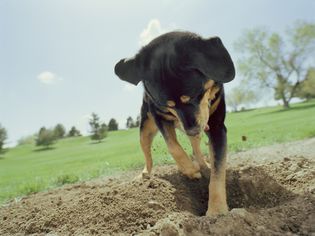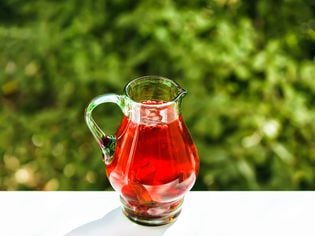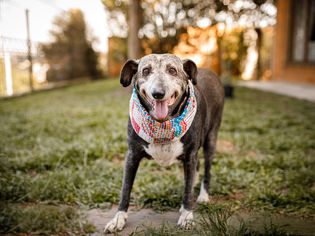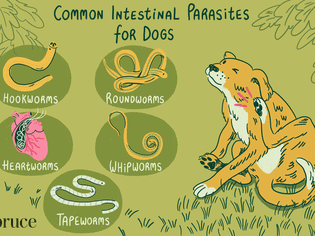‘Tis the season for glittery decorations, scrumptious foods, and beautiful blooms. With their stunning red, white, and green colors, it’s easy to see why poinsettias (Euphorbia pulcherrima) are a holiday decor staple. If you’re considering getting this plant to bring more holiday cheer to your home, you might wonder, "Are poinsettias poisonous to dogs?"
The short answer is kind of. Poinsettias have a reputation as a toxic plant but are only mildly toxic, David Israel, DVM, medical director at Veterinary Emergency Group (VEG) in Denver, Colorado says.
Here’s what you should know about the risks of poinsettias and dogs and what to do if your dog makes a chew toy out of your favorite holiday plant.
Are Poinsettias Poisonous to Dogs?
The most common myth surrounding poinsettias is that they’re fatal to dogs if ingested, Renee Schmid, DVM, DABT, DABVT, a senior veterinary toxicologist and director at Pet Poison Helpline says.
In actuality, the toxicity level of poinsettias to dogs is low overall. Much like other substances of any toxicity, there’s a larger risk of symptoms as the amount ingested increases for both small and large breed dogs, she explains.
The belief that poinsettias are poisonous is thought to have stemmed from an unconfirmed report in 1919 that stated a two-year-old child had eaten a leaf and allegedly passed away. Although researchers at Ohio State University (OSU) have found it to be generally safe, the idea that this plant is extremely dangerous lingers over a century later.
The university’s researchers conducted a study on poinsettia ingestion by rats to determine its toxicity. However, they were unable to determine a toxic amount even after testing doses that were equivalent to that of 500–600 poinsettia leaves, or about a kilogram of sap.
If you have an inquisitive canine who’s insistent on investigating anything and everything with their mouth? Ingestion of poinsettias may result in mild symptoms but rarely cause serious illness, Israel says.
Symptoms of Poinsettia Poisoning in Dogs
“Many dogs will ingest small amounts of poinsettias and not develop any symptoms,” Schmid says. Though, as the amount increases, there’s a larger risk for dogs to develop symptoms involving mouth and gastrointestinal tract irritation.
According to our experts, common symptoms to watch for include:
- Drooling
- Vomiting
- Diarrhea
- Decreased appetite
Theoretically, smaller dogs need to ingest less of the plant to cause symptoms due to the fact that they have smaller gastrointestinal tracts, Israel notes. In cases where a dog has ingested a large enough amount, severe symptoms may include continual vomiting or excessive diarrhea.
Other Toxic Plants to Avoid
Although poinsettias aren’t completely risk-free, a few examples of plants truly toxic to dogs include:
- Yew
- Holly
- Mistletoe
- Azalea
- Peace lily
- Amaryllis
- Gardenia
Make sure to keep these away from your dog—or out of your home completely—to prevent poisoning.
What to Do If Your Dog Eats a Toxic Plant
If your dog ingests a tosic plant, Israel recommends contacting your vet or local emergency vet. You can also contact the Pet Poison Helpline (855-784-7661) or ASPCA Animal Poison Control Center (888-426-4435), which are available 24/7. For poinsettias specifically, no treatment is generally needed unless symptoms arise.
Monitor your dog and seek emergency veterinary care if you notice the following signs after they’ve eaten a toxic plant:
- Continual vomiting
- Loss of appetite
- Lethargy
- Vomit containing blood
- Bloody or black diarrhea
Treatment may consist of the following:
- Fluids
- Anti-vomiting medications
- Medications to treat mouth, stomach, or intestine irritation
How to Prevent Your Dog from Ingesting Poinsettia
“The best way to prevent ingestion is to keep the plant away from your dog!” Israel says. “The safest bet is to keep the plant high up and out of the dog’s reach.”
You can also put up a pet gate or dog pen to restrict access to any area(s) where potentially harmful foods, plants, or household items are to keep your pooch safe.
If you’d like to completely eliminate the risk of your four-legged friend getting into poinsettias, you can revel in the holiday cheer by sprucing up your home with these pet-safe plants as alternatives:
- Christmas cactus
- Swedish ivy
- African violet
- Pinstripe calathea (Calathea ornata)
- Rose
- Moth orchid (Phalaenopsis)
- Bromeliad (Aechmea fasciata)
- Boston fern
- Prayer plant
- Spider plant
- Polka dot plant (Hypoestes)
Final Word on Poinsettias and Dogs
The bottom line is that poinsettia's toxicity level is overrated. While ingestion of this festive plant can cause mild symptoms in dogs, it won’t result in severe or life-threatening symptoms. No matter the case, it’s always a good idea to keep anything that may cause any adverse reactions away from your dog—including poinsettias.
If your canine companion is keen on eating plants or other things they shouldn’t, consult a vet for personalized advice to determine the underlying cause and best plan of action.









Comments on "The Surprising Truth About Poinsettias: Are They Harmful to Your Dog?" :